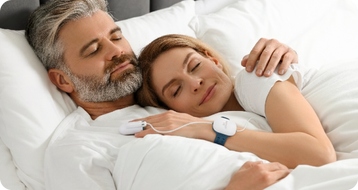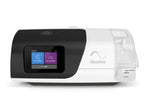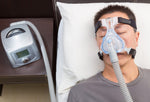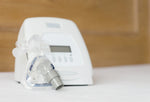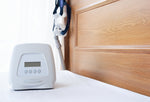On This Page
Does Insurance Cover CPAP Machines?
Our editorial process includes extensive measures to verify accuracy, provide clarity on complex topics, and present factual information. Read more
Key Takeaways
- Medical insurance, Medicare, and Medicaid usually cover most of the cost of CPAP machines and accessories for qualifying policy-holders.
- To qualify for insurance coverage for CPAP equipment, policy-holders must receive a medical diagnosis for obstructive sleep apnea (OSA) or another medical condition CPAP is used to treat.
- Those who want to pay for their CPAP equipment with insurance coverage also need a doctor’s prescription specifying that, without CPAP therapy, they’ll likely need surgery.
- Out-of-pocket costs for CPAP machines vary by the device’s type, size, and brand, but typically start at $700.
What CPAP Insurance Coverage Includes
Insurance coverage for CPAP therapy typically extends beyond just the machine itself, but the specifics can vary widely by provider and plan. Most insurers cover the core components needed for treatment, as long as you have a valid prescription and meet their medical criteria.
CPAP Machines
CPAP machines are often covered at least partially by private insurance and government plans like Medicare or Medicaid. This is becoming increasingly common. From 2014 to 2017, insurance claims with an obstructive sleep apnea diagnosis increased by 850%.
CPAP machines are covered as durable medical equipment (DME), which is defined as equipment used once or on a daily basis for a health condition or injury.
Some CPAP machines aren’t covered under insurance plans. These include travel CPAP machines, which some insurance providers consider non-essential, and some devices with advanced features.
CPAP Mask and Accessories
CPAP masks are available in different designs depending on your sleep style and breathing needs.
- Full face mask: A full face mask covers both the nose and mouth, making it a good option for people who breathe through their mouths or need higher pressure settings.
- Nasal mask: A nasal mask fits over the nose only and delivers airflow through a smaller, lighter frame that works well for most sleepers.
- Nasal pillows: Nasal pillows sit just inside the nostrils to provide a minimalist, low-profile option ideal for light sleepers or those who feel claustrophobic with larger masks.
CPAP masks require tubing that connects the masks to the machine airflow settings. Other accessories can include nasal cushions for a more comfortable fit around the nose area, headgear that keeps the mask in place, and a frame that fits around the mask itself. Most CPAP accessories need to be replaced every few months.
How Insurance Coverage for CPAP Therapy Works
If you have a prescription for a CPAP machine, your insurance provider will speak to a CPAP machine supplier to determine one that best suits your sleep needs and lifestyle.
To ensure you're using your machine correctly, the CPAP supplier will sometimes monitor data from the device itself, usually through a smart card or modem.
Unfortunately, not all private insurance companies will fully cover CPAP machines. This is something you should double-check before choosing a provider. Even with insurance, policy-holders may need to pay fixed out-of-pocket costs to meet their deductibles, copayments, and coinsurance before full coverage kicks in.
Another option is renting a CPAP machine, then filing a claim with your insurance to pay for it. Alternatively, your insurance might accept monthly payments for the CPAP, after which you own the machine outright.
If you're not sure where to start, CPAPinsurance.com is a helpful resource for understanding your options and getting the treatment you need with as little inconvenience and out-of-pocket costs as possible.
What You Need for Insurance to Cover CPAP
In order for your insurance plan to cover the cost of CPAP equipment, you’ll need a diagnosis for obstructive sleep apnea (OSA) or another medical condition CPAP therapy is used to treat. You’ll also need a prescription from your doctor.
Sleep Study and CPAP Prescription
To qualify for a CPAP prescription, patients must participate in a sleep study to determine the severity of their OSA. Sleep studies are conducted at sleep clinics and use a range of sensors and devices to monitor airflow, brain waves, eye movements, heart rate, and trouble breathing throughout the night, among other symptoms.
Sleep study scores are based on the frequency and severity of disturbances at night and difficulty staying awake during the day from lack of quality sleep. If your doctor determines a CPAP will benefit you, they'll likely prescribe it.
The Sleep Doctor Home Sleep Test (HST) is an alternative to an in-lab sleep study that involves wearing a monitor while you sleep in your own bed. You’ll receive an HST kit in the mail with instructions for how to wear the monitor and receive your results. Afterward, your data will be reviewed by a board-certified physician, and you'll meet with a Sleep Care to discuss your test results. You may also get a CPAP prescription and treatment plan, if your diagnosis warrants it.
Compliance Requirements
Because CPAP therapy only works when used consistently, insurance companies often require proof of regular use—known as CPAP compliance—to continue coverage. Experts generally recommend using CPAP for at least four hours per night on most nights, and many insurers follow Medicare’s standard of at least four hours per night on 70% of nights over a 30-day period.
Usage is typically verified through a modem or memory card built into the machine. If you’re struggling to use your CPAP every night, talk to your doctor; they can help troubleshoot comfort issues and determine whether renting a machine before purchasing one may be a good option.
Medicare Coverage for CPAP Equipment
Medicare covers CPAP machines and essential supplies when an adult is diagnosed with moderate or severe obstructive sleep apnea. In addition to diagnosing sleep apnea, the patient’s doctor must attest that if the person does not receive a CPAP machine, they will likely require surgery.
Medicare requires evidence that a prospective CPAP user has stopped breathing, or experienced apnea episodes, at least 30 times during a six- to seven-hour period of sleep, with each episode lasting at least 10 seconds.
After a doctor provides this evidence and the patient meets their deductible, Medicare covers 80% of CPAP machine rental and supply costs as long as the person consistently uses the machine for at least 90 days. After that three-month trial period, Medicare may extend their coverage of the CPAP device if the user goes to an in-person doctor’s appointment.
Following this appointment, the doctor must state in the person’s medical records that they meet specific conditions and are receiving benefit from the CPAP therapy. The doctor must also state that the CPAP therapy is providing benefit to the patient.
People who have Medicare coverage should make sure their doctor and their medical equipment company are enrolled in Medicare. If they aren’t, Medicare will refuse to pay the claim.
Out-of-Pocket Costs and Alternatives
If someone doesn’t have health insurance, they’ll need to cover the cost of their own CPAP equipment and accessories.
Even if someone has healthcare coverage, they may have to pay the full price themselves. This could be because of high deductibles and copayments, or because they want a wider selection of products to choose from. In this instance, people who pay out of pocket do not have to adhere to compliance rules.
Keep in mind that even if you’re paying all the cost yourself, you still need a valid doctor’s prescription to obtain a CPAP machine.
FSA and HSA
Flexible spending accounts (FSAs) and health savings accounts (HSAs) can help lower the cost of CPAP therapy by allowing you to use pre-tax funds to pay for eligible expenses. Most CPAP-related items qualify, including the CPAP machine itself, masks, tubing, filters, humidifier chambers, and replacement supplies.
Because these accounts reduce your taxable income, they can make out-of-pocket costs more affordable. Just be sure to keep receipts and documentation, as some plans may require proof of medical necessity when reimbursing CPAP purchases.
Tips for Navigating CPAP Insurance Coverage
Understanding CPAP insurance coverage can feel overwhelming, but a few practical steps can make the process smoother and help you avoid unexpected costs.
- Review your policy before you buy. Check your plan’s coverage rules for sleep studies, CPAP machines, and replacement supplies. Pay attention to deductibles, copays, rental requirements, and in-network providers.
- Ask about compliance requirements upfront. Most insurers require proof that you use your CPAP regularly to maintain coverage. Knowing your plan’s expectations can help you avoid disruptions in benefits.
- Verify which machines and masks are covered. Some insurance plans only cover certain brands or models. Make sure the equipment your doctor prescribes is eligible under your plan or ask your provider for alternatives if needed.
- Keep records of your sleep study and prescription. Insurers typically require documentation showing a sleep apnea diagnosis and a prescription specifying pressure settings. Having these documents handy speeds up the approval process.
- Check whether reimbursement is an option. If you prefer to buy a CPAP machine out of pocket to avoid rental periods or compliance monitoring, many insurers allow you to submit an itemized receipt for partial reimbursement.
- Use your HSA or FSA if available. CPAP machines, masks, and replacement supplies are eligible expenses under most health savings and flexible spending accounts, which can help reduce your overall costs.
Frequently Asked Questions
How much is a CPAP machine without insurance?
The cost of a CPAP machine depends on a number of factors, including quality, type, price, and size. Standard fixed CPAP machines typically cost $700 to $1,000 without insurance. More advanced devices such as BiPAP and APAP machines can cost significantly more.
In addition to the CPAP machine, you’ll also need to purchase a CPAP mask because this component is sold separately. Other equipment such as the connective tubing, humidifier, and air filter are included with your CPAP machine purchase.
How much does a CPAP machine cost with insurance?
Private insurance, Medicare, and Medicaid will usually cover a percentage of the cost of a CPAP machine as long as it's deemed medically necessary. How much the insurance provider pays depends on your particular plan.
Does insurance cover APAP or BiPAP machines?
APAP and BIPAP machines are alternative devices to CPAPs. An APAP’s main purpose is regulating airflow breath-by-breath. A BIPAP is designed to keep the airflow regulated as you breathe in and as you breathe out through two separate pressure settings, one for inhaling and one for exhaling.
Like CPAP machines, most insurance policies will help offset some of the cost of BiPAP and APAP machines. Since BiPAP and APAP devices tend to cost more than fixed CPAP machines, you may need to pay more out of pocket even if your insurance plan covers the same percentage of the cost.


